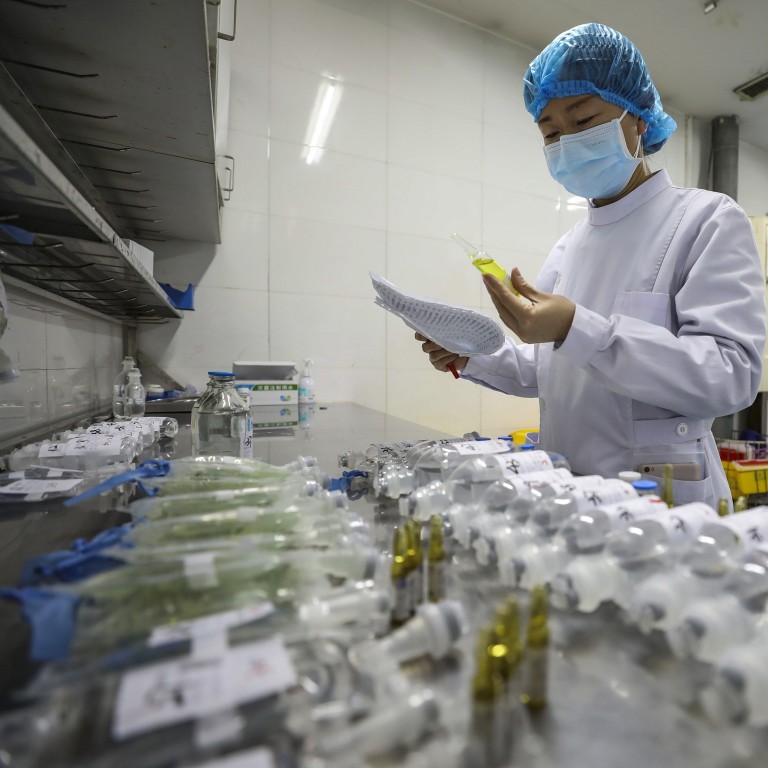
China to expand plasma treatments for coronavirus patients
- Treatment has previously been used on victims of swine and bird flu and ‘looks promising’, says respiratory expert Zhong Nanshan
- Patients who have recovered from Covid-19 found to have virus-neutralising antibodies in their blood, but supplies are limited for now
Plasma treatments for Chinese Covid-19 patients will be expanded to another province, one of the country’s leading respiratory disease specialists said on Tuesday.
Zhong Nanshan told a press conference on Tuesday that the treatment would be given to severely ill patients in Guangdong province – but not critically ill ones because of the risk of complications.
The treatment has already been given to a small number of patients in Hubei, the province at the centre of the outbreak, with positive results.
“The [plasma] treatment looks promising … It’s old, effective and safe, though supplies might be limited,” Zhong, a renowned respiratory expert who helped expose the scale of the severe acute respiratory syndrome (Sars) outbreak, said.
Plasma therapy was previously used on one H5N1 avian flu patient in Shenzhen 15 years ago and some H1N1 swine flu patients in Hong Kong, which helped lower fatality rates.
Guangdong has also used it to treat children suffering severe adenovirus infections, which cause respiratory illnesses, although the number of cases was not statistically significant, Zhong said.
Last week, China National Biotec Group, a state-owned company under the Ministry of Health, announced that virus-neutralising antibodies had been detected in the plasma of patients who had recovered from Covid-19.
Plea for plasma after positive results with coronavirus patients in China
The company said these antibodies had helped treat more than 10 critically ill patients and reduced their inflammation after 12 to 24 hours of treatment.
The authorities in Hubei, Guangdong and Shanghai have appealed for more blood donations to expand the treatment.

Additionally, Zhong said chloroquine phosphate, an 80-year-old malaria drug, merited further investigation as some patients given it had recovered more quickly, but more research was needed to determine whether it would help cure the illness.
“A considerable number of patients under clinical observation tested negative for the virus within 15 days. Symptoms of fever and the virus disappeared one day earlier for those who took the drug compared with those who didn’t,” he said.
Rare coronavirus cases can have unusually long incubation period
Chloroquine phosphate has been given to 128 patients in Guangdong – 93 of whose condition had improved conditions, with 26 being discharged by Monday afternoon, Jiang Shanping, a doctor from Sun Yat-sen hospital in Guangzhou, said at the press conference.
Jiang said it would be used in hospitals of Hubei province, the epicentre of the outbreak, where Guangdong medical teams are stationed.
12,000 Chinese blood plasma treatments contaminated with HIV
Zhong said that current observations suggested the drug would be “helpful” but if patients “receive good care, such as nutrition, in hospital the viral load will be released without medicine.”
However, he continued “there are too many patients in Wuhan and they can’t obtain good care”.
There are currently no fully licensed treatments or vaccines for the coronavirus that causes Covid-19, but the WHO director general Tedros Adhanom Ghebreyesus said last week that the first vaccine may be available within 18 months.
Purchase the China AI Report 2020 brought to you by SCMP Research and enjoy a 20% discount (original price US$400). This 60-page all new intelligence report gives you first-hand insights and analysis into the latest industry developments and intelligence about China AI. Get exclusive access to our webinars for continuous learning, and interact with China AI executives in live Q&A. Offer valid until 31 March 2020.


